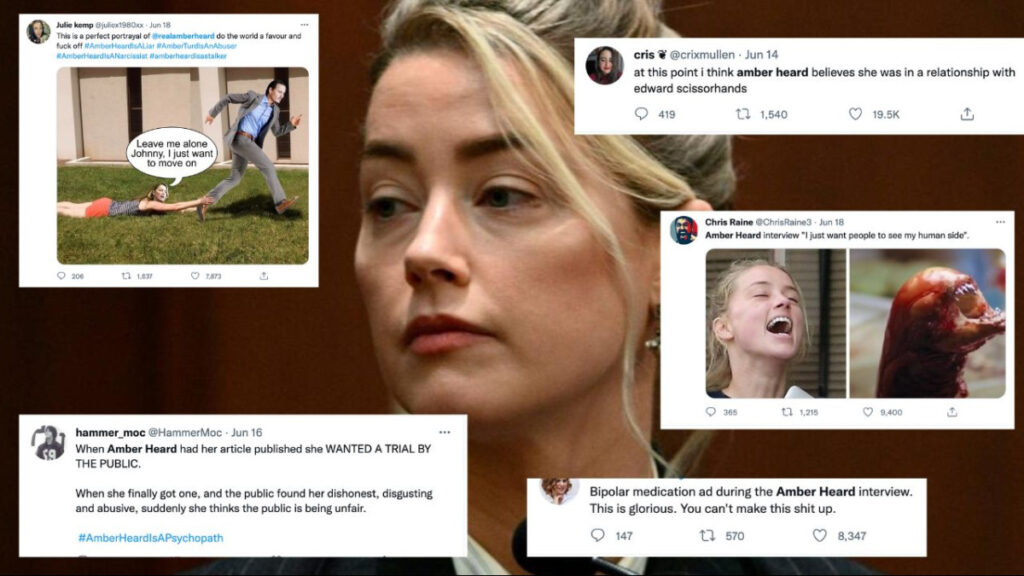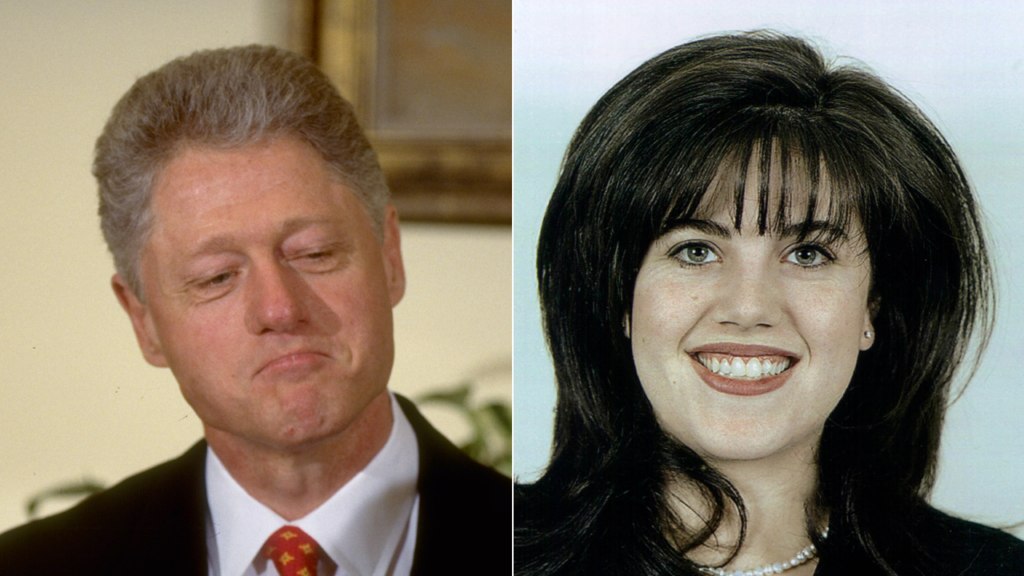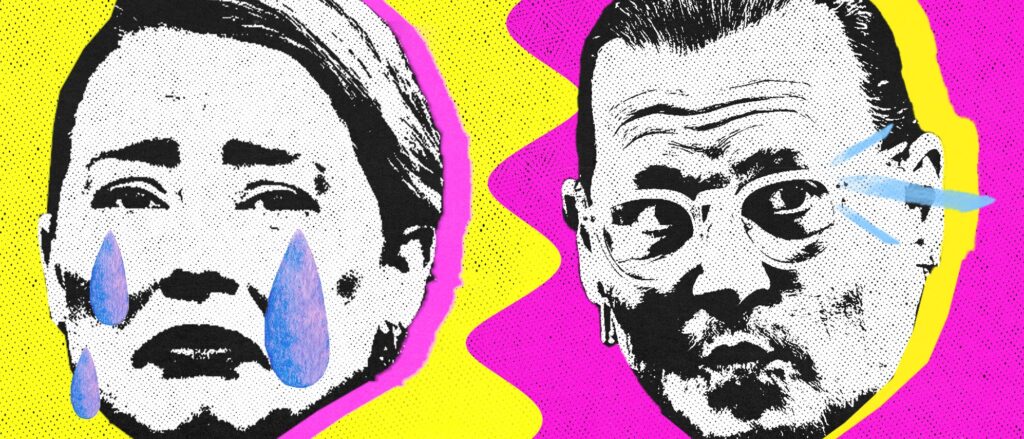Regardless of your interest or the lack thereof, in the Amber Heard- Johnny Depp defamation trial, it found you seamlessly. Social media was abound with videos titled, “Best of TikTok Johnny Depp and Amber Heard Trial”, “7 Biggest Lies Camille Vasquez Forced Amber Heard To Admit”, “8 Times Where Amber Heard Acted Like A Maniac” etc. Several videos on the internet such as “Body Language Analyst REACTS to Johnny Depp Lawyers. Why did Amber Heard LOSE?” had ‘body language experts’ who went on to clinically analyse Heard’s behaviour, her every gesture and word in court. In another 10 minute long video titled Body language expert on Amber Heard and Johnny Depp’s testimonies, after painstakingly dissecting her conduct in court goes on to conclude: Everything Amber Heard does, to me, lacks credibility.
Hashtags such as #amberturd #amberheardisanabuser #amberheardfake #amberheardtrailmemes #amberheardtrailspoof dominated Twitter and Instagram. International media houses also reported that a “sad face” Snapchat filter called the “Amber Heard filter” appeared, mimicking her crying on the stand. Users who were thirstily consuming the content declared how Amber was ‘an embarrassment to any person who has been through the reality of domestic violence’ and how she ‘does not behave like a victim.’ All commentary on Depp was all but appreciative with many claiming, ‘Johnny fought to have cameras in the court …a guilty man would never do that….enough said! The man’s innocent! Also his calmness proves it as well.’ Experts have even warned of social media’s algorithms that meticulously amplified the Heard memes and the pro-Depp content.

While the US has a long history of televised cases, not many trials have received the kind of attention that this trial has. The livestreaming of the Heard-Depp court proceeding easily lent itself to misogynistic scrutiny and ‘memefication of domestic violence.’ It prepared a fertile ground for people to openly voice their prejudices about domestic and gender-based violence.
During the trial, Depp admitted to have sent violent messages to his friend about Heard. Sample this: Lets burn Amber!!!Let’s drown her before we burn her!!! I will fuck her (sic) burnt corpse afterwards to make sure she is dead. He also admitted to having called Heard a “filthy whore”, a “cheap hooker” while she was still married to him. The trial was also the first time that Heard’s legal team publicly accused her former spouse of sexually assaulting her. Interestingly though, these serious accusations of abuse and open admissions of violence made by Depp during the trial were barely critiqued and found no resonance with the public even though social media was replete with minute analyses of Heard’s behaviour in court.
These form a part of just some of the many disturbing patterns emerging from the contentious court battle between Heard and Depp. Depp had initiated a defamation suit against Heard for $50 million in response to a 2018 Washington Post op-ed where Heard stated that she was “a public figure representing domestic abuse, and I felt the full force of our culture’s wrath for women who speak out.” While Heard had not identified her abuser as Depp, his legal team claimed that it was “plainly” about him and that it had cost him his career and reputation.

While a public court proceeding is often justified as a means to ensure transparency in the US, the excessive media glare went way beyond this purported intention. Monica Lewinsky, who was one of the earliest victims of ruthlessly salacious media coverage, said of the current trial: we have sampled mediated accounts of the trial on Instagram, Twitter, and Facebook; through memes, video clips, and TikTok nuggets. Our consumption, therefore, has tended to be biased, curated, and cursory. She went on to assert that the in co-opting the trial for our own purposes we have devalued our own dignity and humanity.
The serious accusations of abuse and open admissions of violence made by Depp during the trial were barely critiqued and found no resonance with the public even though social media was replete with minute analyses of Heard’s behaviour in court.
The numerous memes, vicious parodies and video snippets of the trial have been making the rounds on social media and the unending social media glare made it feel like Depp had already won the case even before the seven-member jury could pronounce its decision. This bears eerie resemblance to the hostility that domestic abuse survivors face in our own country. Although ground realities tell a different story, sustained campaigns to validate the myth that women file ‘false domestic violence’ cases have greatly succeeded. They have influenced state institutions, worked to almost entirely delegitimise victim narratives and have desensitised the society to the menace of domestic violence. These consequences are further compounded in highly sensationalised court proceedings, such as this one, which involve violence and celebrities as they often have major social impacts. For example, many psychologists have reported that husbands and boyfriends have now begun to call their wives and girlfriends “Amber” when the women get angry or upset.
Heard’s ordeal is also similar to that of the Indian journalist, Priya Ramani who had to fight a similar defamation trial against her alleged abuser, MJ Akbar. Given that defamation suits are weaponised against survivors for speaking up worldover, Depp’s suit in itself can be seen as an extension of his abuse of Heard. The case is a sobering reminder that irrespective of significant advances by feminist movements, women across the globe continue to face public censure and disgrace for daring to speak out about their traumatic experiences.

Even as this social media carnival was underway, media narratives increasingly and deceptively characterised the Amber-Heard relationship as a “mutually abusive, mutually toxic relationship”. Nonetheless, lawyers and psychologists specialising in gender justice have pointed out that terms such as these are often strategically deployed to minimise the gravity of domestic abuse and to argue that both parties are complicit in the violence. While not contending that abuse is always one-sided, it is important to recognise that survivors’ violent outbursts, physical/mental abuse is often a consequence of being excessively controlled/abused. Subsequently, the fallacy of “mutual abuse” topples the idea that abusive relationships have a perpetrator of violence and a victim. Therefore, although seemingly objective in its assessment of a relationship, this framework is often bereft of an understanding of the gendered power dynamics that operate and is gender unjust. Needless to say, the media normalising this understanding can be deeply injurious to all survivors of abuse and their ability to fight back.
Gender justice conversations on social media can take fatal turns much to the detriment of survivors. While the medium can act as a great tool of democratisation, it also runs the risk of shutting the door on earnest, nuanced engagements. Social media response to the MeToo movement or the discourse around the recent hijab issue in Karnataka are cases in point to demonstrate how social media can be weaponised to further intimidate and marginalise an already vulnerable grouping. Critical discussions on intimate violations cannot happen on unmonitored spaces where norms of gender sensitivity do not operate. Whatever be one’s opinion on the trial, we must consciously ask ourselves – What all does being able to have an opinion allow us to do?
(Poorna Ravishankar is a lawyer and researcher with the Alternative Law Forum, Bangalore)






























